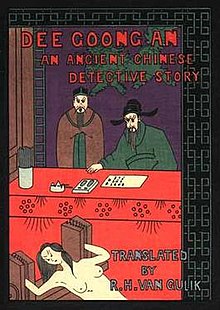Di Gong An

Cover first edition translation
|
|
| Author | Unknown |
|---|---|
| Original title | Dee Goong An |
| Translator | Robert van Gulik |
| Country | China |
| Language | Chinese |
| Series | Judge Dee |
| Genre | Gong'an fiction, Mystery, Detective novel, Crime |
|
Publication date
|
18th century |
|
Published in English
|
1949 |
| Media type | Print (Hardback & Paperback) |
| Pages | 237 (English) |
Celebrated Cases of Judge Dee (Chinese: 狄公案; pinyin: dí gōng àn, lit. "Cases of Judge Dee", also known as Di Gong An or Dee Goong An) is an 18th-century Chinese gong'an detective novel by an anonymous author, "Buti zhuanren" (Chinese: 不题撰人). It is loosely based on the stories of Di Renjie (Wade-Giles Ti Jen-chieh), a county magistrate and statesman of the Tang court, who lived roughly 630–700. The novel contains cultural elements from later dynasties, rather than Tang Dynasty China, however.
The Dutch sinologist and diplomat Robert van Gulik came across a copy in a second-hand book store in Tokyo and translated the novel into English. He then used it as the basis to create his own original Judge Dee stories over the next 20 years. Van Gulik wrote:
The translation was first privately printed on behalf of Van Gulik by the Toppan Printing Company of Tokyo, in a limited run of 1200 numbered signed copies.
The translation features nine drawings, three copies from old Chinese art, and six illustrations by the author.
As carefully noted in his scholarly postscript, the present book is in fact a translation of only about half (31 out of 65 chapters) of a Chinese book in Van Gulik's possession, entitled "Four great strange cases of Empress Wu's reign". Van Gulik obtained three editions of that book – a 19th-century manuscript and two printed editions, published respectively in 1903 and in 1947 at Shanghai. There were many differences between variant texts, Van Gulik considering the 19th Century version the best and basing his translation mainly on it.
The part which Van Gulik translated describes Judge Dee simultaneously solving three difficult criminal cases, culminating with his being rewarded by promotion to the Imperial court (which, Van Gulik notes, was the traditional culmination of a Chinese story about an official). The later 34 chapters described events at the Court (where the historical Judge Dee is known to have been a valued adviser to Empress Wu, though his career suffered various ups and downs).
...
Wikipedia
